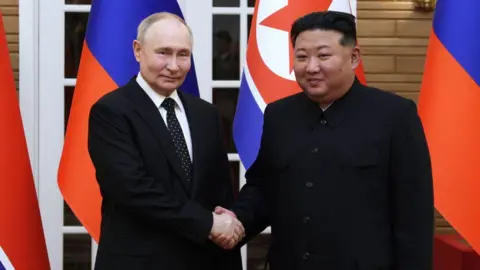
Key Points:
- The recently signed military agreement between Russia and North Korea has heightened anxieties in Asia.
- The pact, which pledges mutual military assistance in the event of war, has been criticized for potentially bolstering North Korea’s nuclear program.
- While the agreement’s scope remains unclear, it underscores the growing security challenges facing the United States and its Asian allies.
Kim-Putin Pact Stirs Anxiety in Asia
A recently signed military agreement between Russia and North Korea has sent shockwaves through Asia, raising concerns of a regional arms race and escalating tensions between democratic and autocratic powers.
The agreement, announced during Russian President Vladimir Putin’s visit to Pyongyang this week, pledges “military and other assistance with all means” should either nation find itself at war. While the pact’s exact scope remains unclear, analysts fear it could bolster North Korea’s nuclear ambitions and encourage its aggressive stance towards South Korea and Japan.
Alarm Bells and Calls for Unity
South Korea condemned the agreement, labeling it “sophistic and absurd” and vowing to strengthen defense cooperation with the United States and Japan. Officials in Seoul expressed particular concern about potential Russian assistance to North Korea’s nuclear program, a move that would directly violate UN Security Council resolutions.
US and Allies See Validation of Security Concerns
The recent agreement between Russia and North Korea has solidified the United States and its allies’ preexisting concerns regarding the escalating security complexities in the region. This development aligns with these nations’ longstanding assessments, which identified North Korea’s military advancements and pursuit of strategic partnerships as potential threats to regional stability.
To counter these perceived threats, the Biden administration has consistently prioritized strengthening collaborative efforts with key regional partners, such as Japan and South Korea. This trilateral cooperation encompasses various strategic initiatives, including, but not limited to, joint military exercises designed to enhance interoperability and readiness and intelligence-sharing mechanisms to facilitate a more comprehensive understanding of the evolving security environment.
The concrete manifestation of a formalized agreement between Russia and North Korea substantiates the strategic foresight of these collaborative endeavors, adding further weight to the argument that mitigating potential risks necessitates proactive regional security cooperation. The possibility of enhanced military and technological cooperation between these two nations amplifies the urgency for continued and potentially expanded trilateral efforts.
Long-Term Implications and Regional Uncertainty
Beyond its immediate impact, the Russia-North Korea pact raises questions about the future security landscape of Northeast Asia. Experts worry that the agreement signals a deepening strategic alliance between Moscow and Pyongyang, potentially leading to increased arms proliferation and emboldened military actions.
Some analysts believe the situation underscores the need for continued trilateral cooperation between the US, Japan, and South Korea, arguing that a united front is crucial to deterring aggression and maintaining stability in the region. However, others caution against further antagonizing China and Russia, emphasizing the need for a more balanced diplomatic approach.
As the situation unfolds, one thing is sure: the Russia-North Korea pact has introduced a new level of uncertainty and complexity to an already volatile region.
